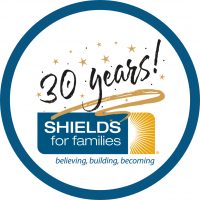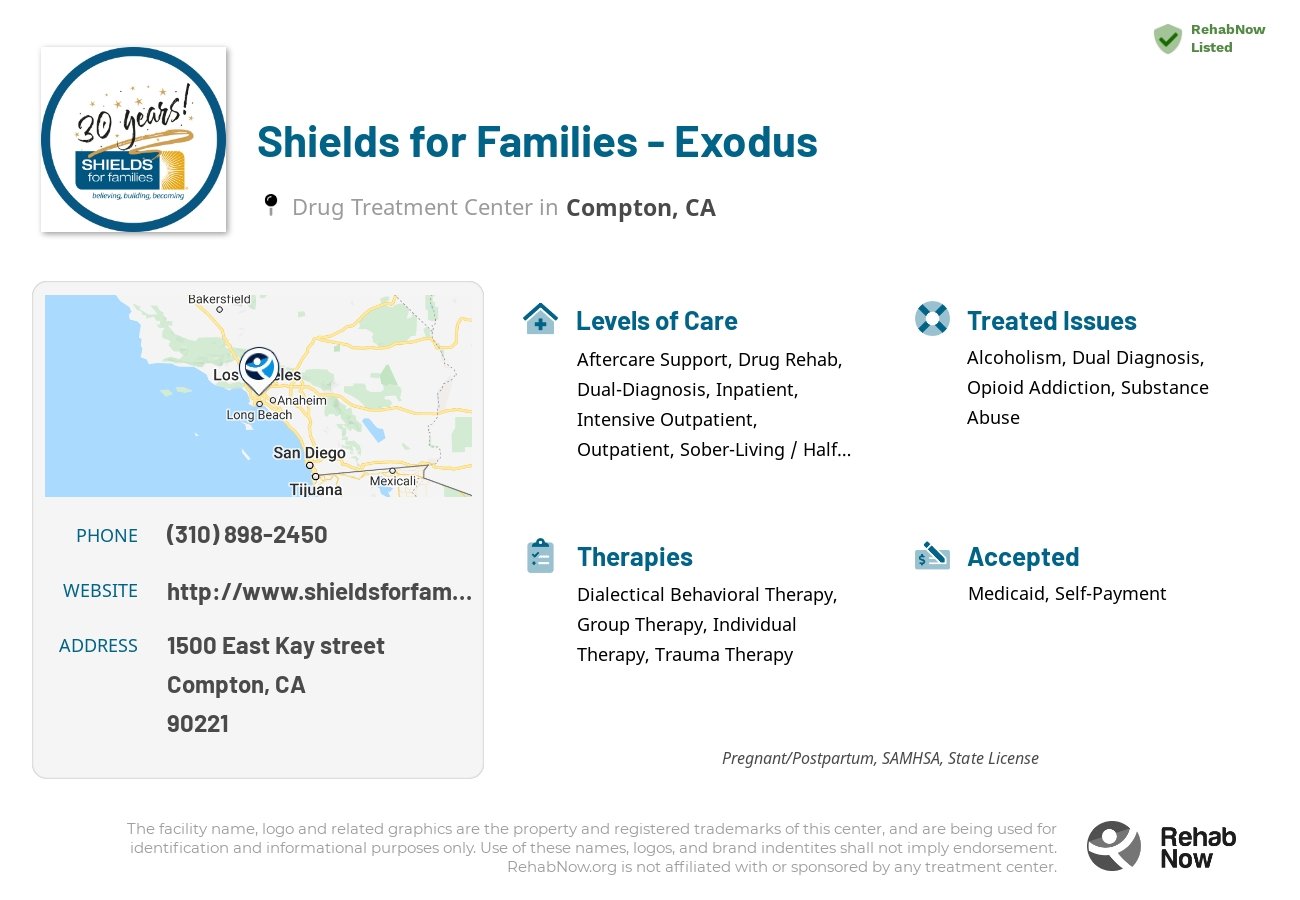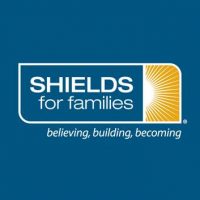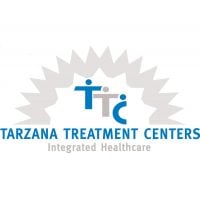Shields for Families - Exodus
Drug Rehab Center in Compton, California
Shields for Families - Exodus is a SAMHSA accredited Addiction Treatment Facility offering a comprehensive range of services including medically supervised detoxification and personalized care to address substance abuse and addiction.
Multiple patients have reported Shields for Families - Exodus as permanently closed.
Research other rehabs in Compton, California, or get help finding an open facility.
About Shields for Families - Exodus in California
Shields for Families - Exodus in Compton, California, extends comprehensive support services to individuals and families wrestling with addiction, emphasizing a family-centered approach. Unique in its comprehensive care model, the facility provides an array of outpatient support services, including vocational and educational assistance, designed to confront a multitude of challenges beyond addiction.
- Offers broad-ranging support not limited to addiction, including mental and behavioral health services, housing, and educational support.
- Accepts a wide variety of insurance plans, ensuring accessibility for most individuals seeking help.
- Accredited by the Substance Abuse and Mental Health Services Administration (SAMHSA), highlighting its commitment to high-quality care.
With accreditations from SAMHSA and a valid state license, Shields for Families - Exodus exemplifies excellence in treatment standards. By accepting an extensive range of insurance providers, the facility ensures that comprehensive outpatient services are accessible to a wide demographic, focusing on empowering clients through various life challenges.
Shields for Families - Exodus specializes in treating alcoholism, opioid addiction, substance abuse, and dual diagnoses, utilizing personalized treatment methods. Offering outpatient, inpatient, and intensive outpatient services, the facility is equipped to provide the appropriate level of care for each individual's needs, further supported by aftercare to sustain sobriety.
Genders
Ages
Modality
Additional
Accreditations
State License
SAMHSA
Conditions and Issues Treated
It’s not easy getting sober on one’s own, or even going to rehab and escaping the grasp of addiction by oneself. Substance abuse treatment gives addicts a place to stay sober while learning what it takes to quit for good. They will learn from others about what works and what doesn’t work with remaining drug-free.
Treatment centers such as Shields for Families - Exodus focus on the needs of individual addicts to heal them. There is a combination of physical and mental therapies that treat the root cause of the addiction, whether it be family problems, stress, or past traumatic events.
The final benefit of substance abuse treatment is introducing new people who can help in your recovery after you leave Shields for Families - Exodus. Through group therapy sessions with other addicts and attending support meetings once a day, a person will learn how to interact with others and cope with cravings. This is a chance for you to rebuild your social circle healthily after you leave treatment.
Opioid addiction starts when a person becomes addicted to legal or illegal opioids. The addiction can happen quickly, in just a matter of days. Opioid withdrawal can be extremely uncomfortable and lead the user to continue to use even if they want to quit. Stopping using an opioid requires medical observation. Sometimes inpatient treatment with a medically supervised detox is necessary for managing the withdrawal process while learning lasting tools for maintaining recovery. Medications may be used in some cases of opioid addiction.
Opioid addiction is one of California‘s most prominent forms of addiction. It’s treated by detoxifying the body so that the chemicals from the medications no longer impact them and by therapies to correct behavior and target the root of the problem.
Recovery is not simply about stopping drug use. Recovery is working with addiction while recovering mental health issues that are fueling the addiction in the first place.
Levels of Care Offered
This center offers a variety of custom treatment tailored to individual recovery. Currently available are Aftercare Support, Drug Rehab, Dual-Diagnosis, Inpatient, Intensive Outpatient, Outpatient, Residential, Sober-Living / Half-Way, with additional therapies available as listed below.
Individuals who are suffering from severe addiction or have a high risk for dangerous health concerns are often recommended to receive inpatient treatment.
Choosing to enter an inpatient treatment program is beneficial for people who are suffering from severe addiction, or who have a high risk for dangerous health concerns.
Inpatient treatment is beneficial for:
- People who have a history of severe withdrawal.
- People who have attempted to overcome addiction on their own without success.
- People who have a history of relapse, or have recently relapsed.
- People at risk for drug overdose or withdrawal-related complications.
- People with medical conditions that are worsened by drug or alcohol use.
Addicts who need help with their addiction can enroll in an intensive outpatient program (IOP). But the patient won’t live there during treatment.
IOP involves patients visiting a medical office building regularly for therapy and other services while continuing to live their lives.
IOP is a step up from drug or alcohol detox, but it’s still a phase of recovery, not the end goal. Patients in need of IOP have many options for rehab and treatment.
Outpatient treatment is considered the lower intensity level of addiction treatment. It’s ideal for early phase addiction or lower intensity addictions. It may include weekly sessions instead of daily. It may include weekly sessions instead of daily. Peer group support, 12-step programs, and individual counseling may still be involved but at a lesser frequency than an intensive outpatient program. It is a good choice for someone who doesn’t need to go through a medically supervised detox and who has a supportive home environment. It requires motivation and dedication to commit to the program without constant monitoring.
Sober living homes (abbreviated SLHs or sometimes sober houses) are temporary housing for recovering addicts. The typical SLH functions as a halfway house, providing a stable living environment for addicts in recovery. While at an SLH, residents typically meet with various therapists on site and attend regular 12-step meetings as well as other recovery group meetings.
Residential treatment programs are those that offer housing and meals in addition to substance abuse treatment. Rehab facilities that offer residential treatment allow patients to focus solely on recovery, in an environment totally separate from their lives. Some rehab centers specialize in short-term residential treatment (a few days to a week or two), while others solely provide treatment on a long-term basis (several weeks to months). Some offer both, and tailor treatment to the patient’s individual requirements.
Aftercare support should take place after outpatient treatment has ended. There are a few different types of aftercare support that patients can seek. These include 12 Step, Self-help groups (AA, NA), Therapeutic communities, Long-term, structured sober living arrangements, and Halfway houses (residential treatment centers).
Therapies & Programs
Individual therapy involves one-on-one sessions between the patient and therapist. It provides patients with a safe environment to openly discuss personal and sensitive issues with the therapist. They find the therapist as someone they can trust. Individual therapy aims to identify the core issues that would have led the patient to substance abuse and address them effectively. The therapist can develop patient-specific customized solutions through individual therapy, which aids speedier recovery.
Groups typically involve meetings with other recovering addicts who can relate to one another’s experiences. They might meet in person or online and typically focus on the process of staying sober rather than overcoming a specific addiction.
In these groups managed by Shields for Families - Exodus, addicts can build a sense of community and develop strong emotional connections with others who understand what they are going through. These beneficial relationships can help addicts overcome their cravings and prevent relapse at any point during the recovery process.
In general, trauma therapy is a clinical process that helps individuals deal with mental stress often caused by traumatic events. The therapist helps the person identify, understand, and work through the problem. This is done with the help of talking about it in group or one-on-one counseling sessions. Therapists use relaxation, role-playing, art, and music to help the person open up about what is bothering them.
There are many different types of trauma therapists, such as psychiatric nurses and counselors. Not everyone is a good candidate for this type of therapy; it is generally reserved for people who have recently experienced a traumatic event and struggle to get over it. It is often done for children, teenage victims of sexual assault, and war veterans.
Dialectical Behavior Therapy (DBT) is a type of therapy created in the late 1980s and early 1990s to help people with high rates of suicidal behavior. DBT helps people learn how to live a life that is no longer controlled by overwhelming emotions and urges. It is beneficial in treating drug addiction because it helps patients understand and cope with their cravings for drugs or alcohol rather than turning to those substances as a way of coping.
There is hope for people who are addicted to drugs and alcohol. Cognitive Behavioral Therapy (CBT) is the solution. CBT focuses on the underlying thoughts and behaviors that caused the addiction problem in the first place and may cause a relapse. This type of psychotherapy addresses negative feelings common in substance abuse disorders. It helps to change them by restructuring thought patterns. It’s about removing negative thoughts and providing long-term benefits while promoting self-awareness, self-control, and healthy ways to respond to negative thoughts. These sessions can be done by themselves or as part of combination therapy.
Payment Options Accepted
For specific insurance or payment methods please contact us.
Shields for Families Associated Centers
Discover treatment facilities under the same provider.
- Shields for Families - Genesis Family Day Treatment Program in Los Angeles, CA
- Shields for Families - Exodus in Compton, CA
- Shields for Families - Eden in Lynwood, CA
- Shields for Families - Los Angeles in Los Angeles, CA
- Shields for Families - Revelation Program in Compton, CA
Learn More About Shields for Families Centers
Additional Details
Specifics, location, and helpful extra information.
Compton, California 90221 Phone Number(310) 898-2450 Meta DetailsUpdated April 15, 2024
Staff Verified
Shields for Families - Exodus Patient Reviews
There are no reviews yet. Be the first one to write one.
Compton, California Addiction Information
More than 3 million of California's citizens are addicted to illegal drugs. Almost 800,000 people use hard drugs, almost 5 million use marijuana, and another 2.1 million abuse alcohol every year. Other substance abuse issues such as binge drinking and teen drug use are also common. Many illegal drugs such as cocaine, heroin, methamphetamine, and marijuana are smuggled into the state from Mexico.
Compton, CA, is located in Los Angeles County, which had the highest number of overdose deaths in 2013. Approximately 9.4% of the population in Compton abuses drugs. Additionally, there are 18.7 alcoholics per 1,000 people in Compton. Drug and alcohol abuse costs the city about $100 million each year. There are plenty of resources available to help someone stay sober, and it's important to seek out those resources.
Treatment in Nearby Cities
- National City, CA (106.3 mi.)
- Chino Hills, CA (27.8 mi.)
- Hermosa Beach, CA (11.4 mi.)
- El Macero, CA (375.0 mi.)
- Atascadero, CA (177.9 mi.)
Centers near Shields for Families - Exodus
The facility name, logo and brand are the property and registered trademarks of Shields for Families - Exodus, and are being used for identification and informational purposes only. Use of these names, logos and brands shall not imply endorsement. RehabNow.org is not affiliated with or sponsored by Shields for Families - Exodus.






